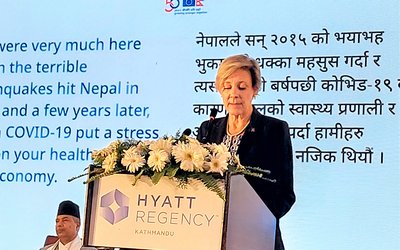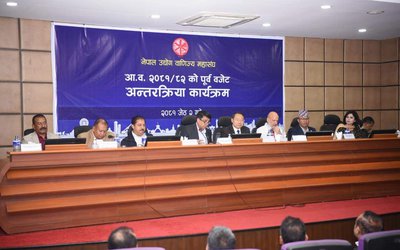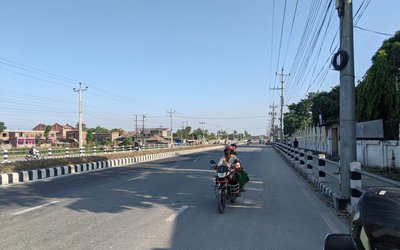
“As much as I am prepared to appear for the exam, I am equally stressed as I have to sit for a 3-hour long exam surrounded by so many students in a class” said Sandesh Shahi, a science student in Herald College, Basundhara. This is a concern for many other students like Sandesh who are appearing for the upcoming grade 12 board examinations.
The new corona virus infections have started surging in recent days with more than thousand new cases a day. The United Nations alerted that Delta variant is more dangerous and transmissible which may even break through protections afforded by the vaccines. Medical experts also have already warned that children may be more prone to the infection. In such unprecedented times, the National Examination Board announced that it would conduct grade 12 exams physically from the 15th of August. On one hand it is absolutely crucial to maintain education quality, and to follow physical exam mechanism to measure students’ actual performance, but on the other hand, given the present situation, it is also imperative to shied students from potential risk. Although the government has stated that it would follow a strict COVID -19 safety guidelines in the examination centers, it is yet to think of ways to ensure the examination centers are hundred percent safe.
At the time of this writing, the cancellation of the exam is uncertain, however, if new COVID-19 cases rise in the next few days, the probability of exams being called off is high. In such case, the government might hand over the responsibility of performance evaluation to the respective schools like it did last year. According to experts, such practice increased questions over its fairness and authenticity as some schools inflated the obtained grades. For instance, students scoring 4 GPA in SEE examination drastically increased by 88 percent last year as compared to the year before that when examination was evaluated externally. Schools inflated grading not only raised eyebrows over deflated education practice, but it also raised questions on students’ true potential.
Both the options – conducting the exams in-person or allowing the educational institutes to self-evaluate - are fraught with challenges. With more than one year of living with the COVID-19 pandemic, lingering confusion as to how the exams should be held shows lag in preparation and negligence from the concerned authority. The government by now should have already come up with a concrete and sustainable plan to conduct a safe exam environment for students or should have thought about other alternative ways to measure students’ performance based on last years’ learning.
Irrespective of the government’s decision regarding the grade 12 examination, it is high time for the government to come up with a COVID-19 examination strategy and policy to make it more sustainable. Upon the first option, if in-person examinations are to be held, the government could opt for the approach adopted by Bangladesh and India. As a mechanism to lessen the transmission virus and ensure effective grading mechanism, Bangladesh and India modified their examination style. In Bangladesh, students were taught shortened syllabus and questions were built based only on the rationalized syllabus to reduce examin duration. Similarly, in few states of India like Jharkhand, Haryana, and Delhi the education board planned to conduct board exams in two phases, question paper were modified to Multiple Choice Questions (MCQ) to limit the duration of the test to just 90 minutes, and increased the number of exam centers to control the crowd.
Upon the second option, if schools are to be given the responsibility to grade students based on the class performance, and also to put an end to the issue of biased marking, the education board and the government should come up with a standard guideline to grade students’ performance like in India where class 10 students would be graded on the basis of their performance in internal exams, pre-boards and practical exams. For grade 12, students marks will be given no only on the basis of internal/pre board, but also on their performance in the final exams of class 10 and 11 with the weightage of 40:30:30 respectively. In addition to assessing performance internally by schools, there should also be a proper documentation of student’s homework, attendance, and class participation.
With the anticipated third wave of COVID-19 pandemic around the corner, there is an urgency to immediately resolve the issue of examining students’ performance with a focused sustainable solution.

Ashika Sharma
Ashika is a Sociology graduate and is a development professional
- Making Digital The New Normal
- Jul 14, 2021
















